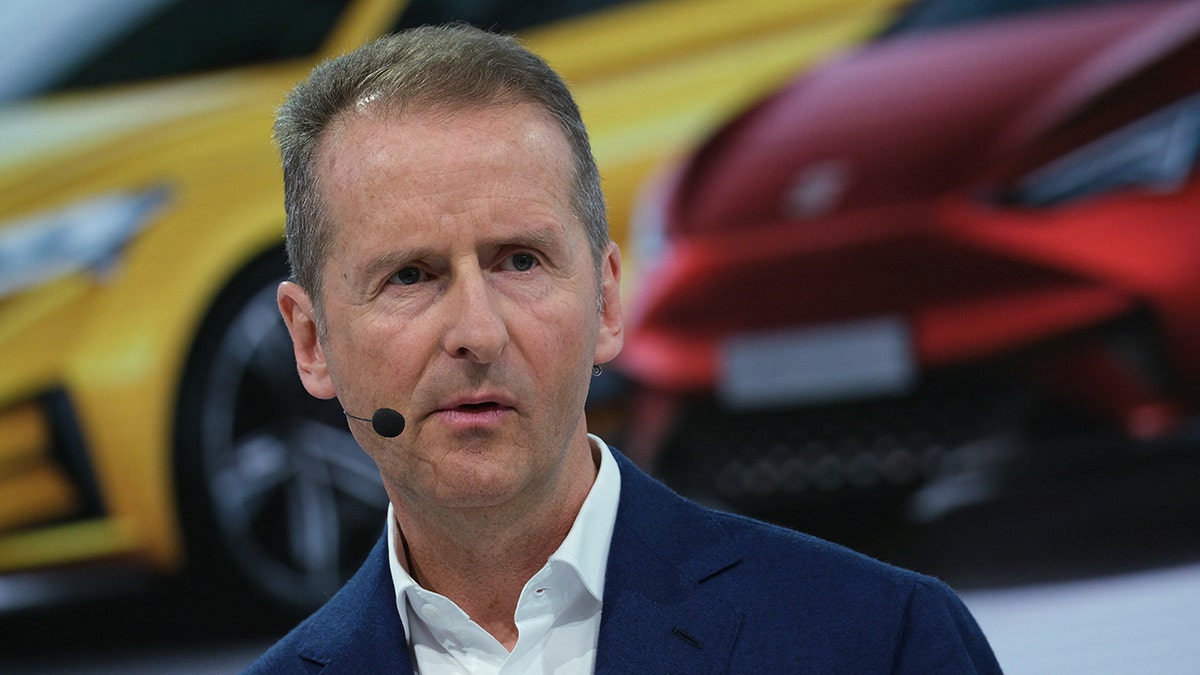
Herbert Diess, CEO of German automaker Volkswagen AG, speaks at the company's annual press conference at Volkswagen headquarters on March 12, 2019 in Wolfsburg, Germany. (Getty)
The chief executive of Volkswagen has apologized for evoking the infamous slogan that appears at the gates of the Auschwitz concentration camp when speaking about the German company's profits at a meeting on Tuesday.
CEO Herbert Diess said he should not have uttered “Ebit macht frei,” a phrase echoing "Arbeit Macht Frei", which means “work sets you free” and is synonymous with the camp. Ebit is an acronym for "earnings before interest and taxes".
Diess issued a statement calling his use of the phrase “definitely an unfortunate choice of words,” according to the BBC.
CATALAN GOVERNMENT OFFICIAL UNDER FIRE AFTER TWEET QUOTING ANNE FRANK
"At no time was it my intention for this statement to be placed in a false context. At the time, I simply did not think of this possibility."

United States Vice President Mike Pence and his wife Karen Pence, right, stand with Poland's President Andrzej Duda and his wife Agata Kornhauser-Duda, left, under the gate during their visit at the Nazi concentration camp Auschwitz-Birkenau in Oswiecim, Poland, Friday, Feb. 15, 2019. They stand under the infamous "Arbeit Macht Frei" sign (AP)
The incident refocused attention on the company’s Nazi origins, a chapter that it has struggled to acknowledge and get past.
FORD AND VOLKSWAGEN ANNOUNCE ALLIANCE TO BUILD PICKUPS AND VANS
Nazi guards kept watch over slave workers from concentration camps at the Volkswagen plant, feeding them poorly and beating or shooting them for minor mistakes, according to The New York Times.
Nazis took away the children who were born to the slave workers and put them in a facility that had Nazi supervision and had inhumane conditions. The Times said that more than 300 children died at the nursery.
US AMBASSADOR URGES GERMANY TO BAR ENTRY OF CONVICTED PALESTINIAN TERRORIST
In 2016, Volkswagen came under fire when its company historian, who had researched and reported the car manufacturer’s Nazi past, left under unclear circumstances.
CLICK HERE FOR THE FOX NEWS APP
The historian, Manfred Grieger, and Volkswagen did not comment on what led to the end of his employment, adding fuel to the theory that he had been dismissed after revealing much more than the company wanted. The abrupt departure of the historian prompted 75 of Germany’s most prominent scholars to sign an angry letter that accused Volkswagen of firing Grieger for punitive reasons.
